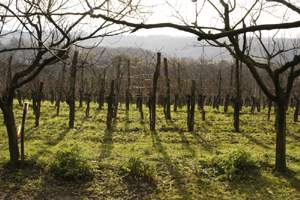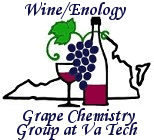Enology Notes
Enology Notes #123, January 9, 2007
To: Regional Wine Producers
From: Bruce Zoecklein, Head, Enology-Grape Chemistry Group, Virginia Tech
Subject: Winery Planning and Design Workshop; VVA Winter Meeting Highlighting Cabernet franc and Petit Manseng; Virginia Tech’s Enology Service Laboratory; New Version of Winery Planning CD Available
1. Winery Planning and Design Workshop. A Winery Planning and Design Workshop is scheduled for March 5, 2007 in King of Prussia, PA, one day prior to the start of this year’s Wineries Unlimited program. The Valley Forge Convention Center is just outside of Philadelphia. Registration information is available at www.wineriesunlimited.com.
While the fundamentals of winemaking have changed little over the centuries, the design of a functional winery for the 21st century has changed dramatically. Wineries must be more than processing facilities. They should have architectural merit and must be efficient in terms of energy and resources, be environmentally responsible, and support the brand image they desire.
This Winery Planning and Design Workshop includes selected consultants, California-based winery architects and planners, and will involve the following:
Winery Design
- Winery Design Considerations
- Winery Layout
Winery Equipment
- Equipment Considerations
- Equipping a Small Winery
- Fermentation and Storage Vessel Considerations
- Wine Caves
- Gravity Flow Winery Designs
Examples of Winery Designs
- Winery Architecture
- Winery Designs, Case Studies, and Winery Tasting Room Design
Wastewater Treatment
Also included: winery business planning, winery economics, and refrigeration.
For registration information, see http://www.wineriesunlimited.com.
Please note: Pre-registration deadline is Monday, February 26.
Please note: The Winery Planning CD (see below) is NOT included with registration. A hard copy manual specific to the course topics will be provided.
2. VVA Winter Meeting. The Winter Meeting of the Virginia Vineyards Association is scheduled for February 8-10, 2007 at the Omni Hotel, Charlottesville. This year, it will feature two interesting grape varieties, Petit Manseng and Cabernet franc.
Winemakers are aware that wine flavors have many contributing elements. What is not well understood is that the grape carries a flavor quotient that relates to its herbaceous and vegetative origin, and how to best manage those flavors to produce a balanced wine. This is notably true with varieties like Cabernet franc that can have excessive herbal characteristics that can disbalance the product. Viticultural and enological factors impacting herbaceousness were outlined in Enology Notes #94, 114, and 115. These will be discussed and reviewed during sensory evaluations of various Cabernet franc wine styles.
Petit Manseng is one of the grapes from the Jurançon region near the suburbs of Pau in the southwestern region of France. Members of the Virginia grape and wine industry visited during one of our study tours. (A review of our tour of this region, with pictures and a technical overview, is available at www.vtwines.info. Click France Study Tour 2002, Day 4.) Petit Manseng, with its small berries and thick skin, has proven to be well suited to the soils and climate of Virginia. The grape has high sugar and high acid, a rather unique feature that allows for broad stylistic variation.
The photo is of a Petit Manseng vineyard from Château Jolys in the Jurançon
region of France. The dry wines are usually made from the variety Gros Manseng.
Grapes for dry style are picked when the berries still have a green color.
At Château Jolys, they believe this adds freshness and life.  Dry
white styles are grassy and crisp, with high levels of green-apple-like acidity.
The alcohol levels are often perceptible, with floral, herbal aromas. In some
cases, extended aging sur lie in older barrels is used to help to
integrate the acidity and phenolic elements. The wines could be served as an
aperitif or paired with seafood.
Dry
white styles are grassy and crisp, with high levels of green-apple-like acidity.
The alcohol levels are often perceptible, with floral, herbal aromas. In some
cases, extended aging sur lie in older barrels is used to help to
integrate the acidity and phenolic elements. The wines could be served as an
aperitif or paired with seafood.
The sweet wine styles from this region are very special, with good concentrated spicy or nutty flavors. The aromas are often of spices, honey, grapefruit, pineapple and ripe peaches, with flavor complexity and integration. Increased complexity is achieved with each picking, first in October, then November, December, and occasionally January. The sweetness of these wines is balanced by the very high acidity which provides palate crispness. The wines can be aged or enjoyed in their youth.
The program devoted to Petit Manseng will include sensory evaluations contrasting regional wines with those from France.
VVA program details and registration information are available at http://virginiavineyardsassociation.com.
3. Virginia Tech’s Enology Service Laboratory. In November of 2006, the Enology Analytical Services Laboratory sent out a five-state survey to address winemakers’ concerns with Laboratory Analysis. We would like to thank those who responded; we received three times as many responses as expected.
We would also like to invite those who have not responded yet to fill out the survey online at www.vtwines.info, under Enology Service Lab > Lab Analysis Survey.
The survey divided responses by winery location, size, and usage of commercial service laboratories. Key findings were as follows.
- 71% of survey respondents produce less than 5,000 cases of wine per year.
- Of the wineries not using a commercial service laboratory, 89% stated the reason was cost.
The Economics of Laboratory Services
A study conducted in 2000 found that the average production cost for a 5000 case winery producing four varietal wines was $92 per case, or $460,000 for 5000 cases.
The average cost of an analysis would be:
- Juice Panel at pressing - $60
Brix, Fermentable Nitrogen, pH, Malic Acid, Titratable Acidity - QC Panel during fermentation - $45
Titratable Acidity, pH, Volatile Acidity, Free & Total Sulfites - Basic Chemistries at end of yeast fermentation - $95
Alcohol, Titratable Acidity, pH, Volatile Acidity, Free & Total Sulfites, Malic Acid, Fermentable Sugars - Post-Fermentation Analysis following MLF - $45
Volatile Acidity, Malic Acid, Fermentable Sugars - Alcohol and Stability Panel before final bottling - $90
Alcohol, Cold Stability, Heat Stability, Malic Acid, Fermentable Sugars
The total cost for these analyses is $335 per varietal, or $1,340 for four varietals.
This represents a 0.2% increase in the cost of production, or less than 3 cents per bottle. Using these same numbers for a 1,000 case winery, the cost is still only $1.80 per case.
This simplification of the winemaking process does not include individual lots, but it is a helpful gauge. At every step of this process, a commercial laboratory should be able to point out potential problems before they happen, keeping future costs down.
I offer this breakdown of costs to demonstrate that wine analysis is cost effective for any winery.
Compare the cost of this analysis schedule (3 cents per bottle) to the number of bottles that are used in the tasting room or at festivals, or given away to employees, friends, and relatives.
It is better to spend the equivalent of 2 cases of wine at retail, than to have to treat, blend, or discard 420 cases (1,000 gallons) of wine in the end. The journey of 1,000 miles begins with the first step; the path to premium wine starts in the vineyard and the winery. - Ken Hurley, Enology Service Lab Manager, .
4. New Edition of Winery Planning and Design CD Available. Edition 12 of the Enology-Grape Chemistry Group’s comprehensive 200-page review covers the essential planning and design considerations of critical importance in winery establishment. The Winery Planning and Design CD is available through Practical Winery and Vineyard magazine for $95. Email them at or call (415) 479-5819.
![]()
Subscription to Enology Notes. All past Enology Notes newsjournals are posted on the Enology-Grape Chemistry Group's web site at: http://www.vtwines.info/.
To be added to (or removed from) the Enology Notes listserve send an email message to with the word "ADD" or "REMOVE" in the subject line.
Dr. Bruce
Zoecklein
Professor and Enology Specialist Head Enology-Grape Chemistry Group
Department of Food Science and Technology, Virginia Tech
Blacksburg VA 24061
Enology-Grape Chemistry Group Web address: http://www.vtwines.info/
Phone: (540) 231-5325
Fax: (540) 231-9293
Cell phone: 540-998-9025
Email:
